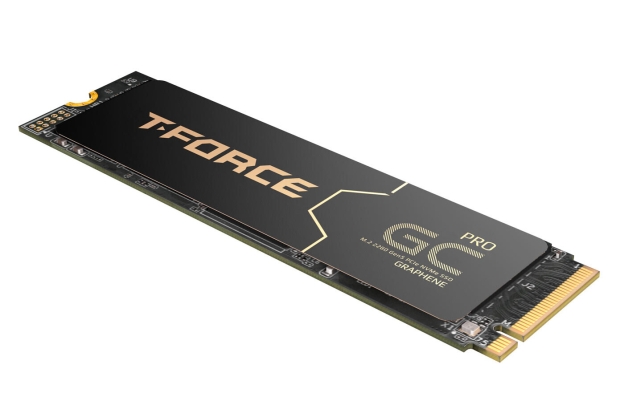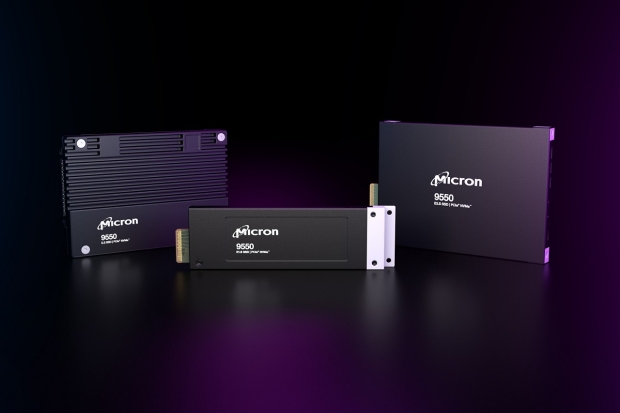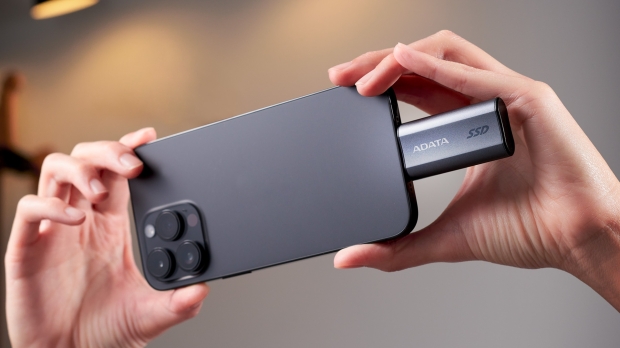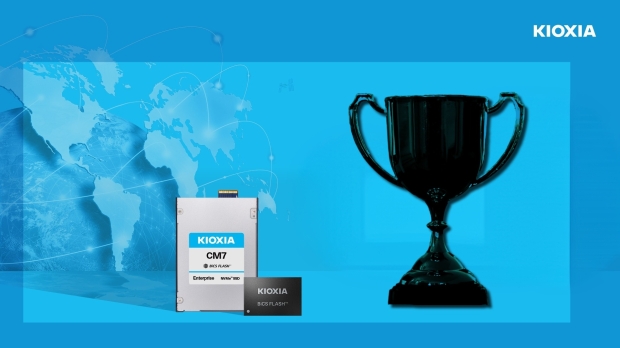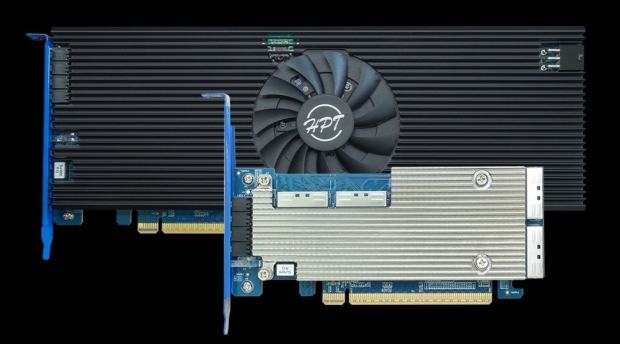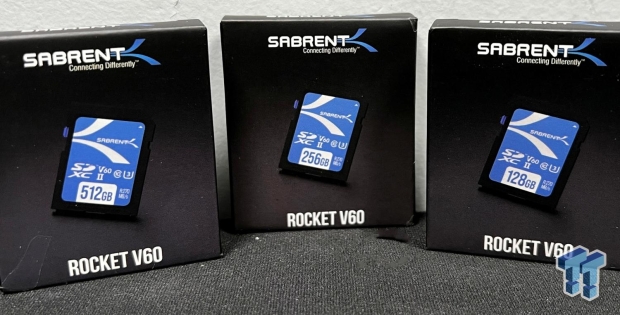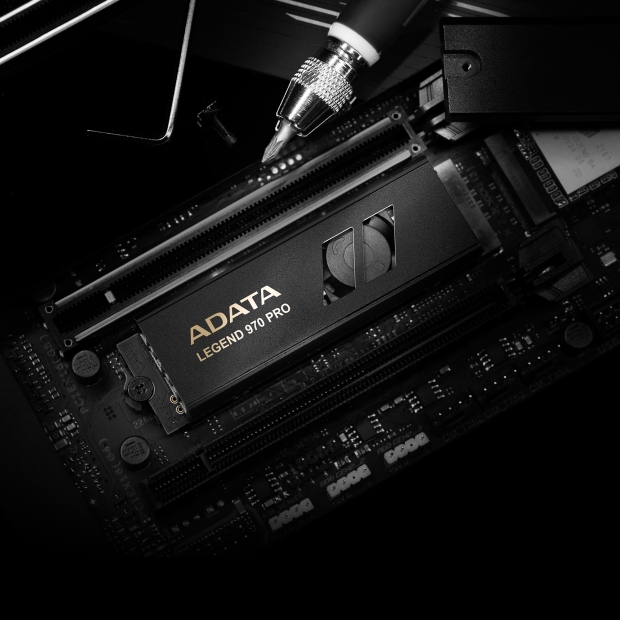Storage News - Page 1
TEAMGROUP launches T-FORCE GC PRO Gen5 SSD: up to 12.5GB/sec reads, up to 2TB capacity
TEAMGROUP has just launched its new T-FORCE GC PRO Gen5 SSD, powered by the InnoGrit "Tacoma" IG5666 controller with slower speeds than the T-FORCE GE PRO that the company launched back in January 2024.
The new TEAMGROUP T-FORCE GC PRO Gen5 SSD comes in both 2TB and 4TB capacities, with maximum sequential reads of up to 12.5GB/sec (12,500MB/sec) and sequential writes of up to 11GB/sec (11,000MB/sec). The new GC PRO Gen5 SSD is aimed at the lower price points, with the 2TB Gen5 SSD featuring 1200 TBW (terabytes written) and the 4TB Gen5 SSD with 2400 TBW.
TEAMGROUP doesn't have the fastest Gen5 SSD on the market, Sabrent takes the position there, but it's yet another Gen5 SSD on the market. The more, the better... slowly giving us more options, different price points, and a fleet of super-fast Gen5-ready SSDs for AMD Ryzen 9000 series and Intel Core Ultra 200 series CPU owners of the new future.
Micron intros 9550 Gen5 SSD: the world's fastest data center SSD, 14GB/sec for AI workloads
Micron has just announced its new Micron 9550 PCIe Gen5 SSD which is the world's fastest data center SSD and industry leader in AI workload performance and power efficiency.
The company has combined its in-house Gen5 SSD controller, NAND, DRAM and firmware into "one world-class product" with the new Micron 9550 Gen5 SSD. This new integrated solution provides class-leading performance, power efficiency, and security features for data center operators.
Micron's new 9550 SSD offers 14GB/sec sequential reads and 10GB/sec sequential writes, which the company says provides up to 67% better performance over similar competitive SSDs, and enables industry-leading performance for demanding workloads like AI.
ADATA's new SC750 External SSD shows us the future of USB thumb drives
USB sticks, thumb drives, and tiny portable storage devices that can fit on a keychain and move more quickly from device to device have been staples for what feels like decades. These storage devices have been affordable for quite some time; however, their capacities and relatively slow speeds have made them feel less relevant.
ADATA's new SC750 External SSD is looking to change that because it's a cable-free external SSD roughly the size of a traditional USB thumb drive - with the bonus of read and write speeds of 1,050 and 1,000 MB/s, respectively. As a portable SSD, you've got much larger 500GB and 1TB capacities.
The speed and space offered by ADATA's new SC750 External SSD make it fast and compact enough to connect to an iPhone and record Apple ProRes image files directly to the SSD. It weighs only 11 grams.
Continue reading: ADATA's new SC750 External SSD shows us the future of USB thumb drives (full post)
KIOXIA earns lifetime achievement award for its role in creating and developing flash memory
Flash memory and storage are everywhere: in the PCs we use, smartphones, SSDs, and data centers, powering everything from smartwatches to powerful AI workloads. Flash memory has been a game changer not only in helping usher in a new era of smaller and smarter devices but has also revolutionized several industries.
KIOXIA, the inventor of NAND flash memory, is the recipient of the FMS: the Future of Memory and Storage Lifetime Achievement Award for 2024. The company's engineering team (Hideaki Aohi, Ryota Katsumata, Masaru Kito, Masaru Kido, and Hiroyasu Tanaka) will accept the award for the storage company's "pioneering work in developing and commercializing 3D flash memory."
KIOXIA first showcased its innovative BiCS FLASH 3D flash memory in 2017, and in 2015, it introduced the world's first 256-gigabit, 48-layer 3D flash memory. 3D stacking not only boosts capacity and performance but does so with reliability and efficiency, making it the sort of groundbreaking tech from the company that the award givers are celebrating.
HighPoint teases industry's first PCIe 5.0 x16 NVMe storage: up to 2PB capacity, 60GB/sec reads
HighPoint has unveiled the industry's first PCIe Gen5 x16 NVMe solutions that are capable of offering close to 60GB/sec of real-world transfer speeds, and up to 2PB (petabytes) of storage capacity in a single PCIe slot.
HighPoint has announced that it will showcase its fleet of NVMe AICs, adapters, and external storage solutions for x86 server and workstation platforms and introduce its product roadmap for the second half of 2024 and beyond at FMS 2024 (Flash Memory Summit).
The company is excited to show live demonstrations of its groundbreaking PCIe Gen5 x16 NVMe storage technology at FMS 2024; designed for AI data pipeline infrastructure, the demonstration platform will show the world how HighPoint's new NVMe RAID AICs, adapters and enclosures tackle data ingestion, analysis, and archiving/restoration workflows, and how each device can be managed and monitored through an intuitive, universal web-based software interface.
Sabrent 128GB V60 SD card has reads of 270MB/sec, on sale right now on Amazon UK deals
Sabrent has a new deal on its Amazon UK store for its V60 SD card in the larger 128GB capacity, offering read speeds of up to 270MB/sec that's ready for 8K video recording.
The Sabrent 128GB V60 SD card has a £5 voucher, with the deal starting July 24 and running through July 27, while if you use the following coupon code on the Amazon UK store "5NAHOSPY" you'll get another 20% discount from the 128GB V60 SD card.
If you've got a new DSLR camera or want a new 128GB SD card that's capable of 8K video recording, and you live in the UK, jump on the deal on Sabrents Amazon UK store here.
ADATA's new LEGEND 970 PRO Gen5 SSD: up to 14GB/sec reads, actively cooled SSD with a fan
ADATA has just launched its new LEGEND 970 PRO Gen5 SSD, powered by the new InnoGrit IG5666 controller with read speeds of up to 14GB/sec. Check it out:
ADATA's new LEGEND 970 PRO Gen5 SSD uses a space-saving actively-cooled heatsink that reduces Gen5 SSD temperatures by a huge 20%. The new LEGEND 970 PRO Gen5 SSD "takes it to the next level" by being the only PCIe Gen5 SSD on the market to power its micro-fan directly through the M.2 slot.
The new Gen5 SSD has read speeds of up to 14GB/sec (14,000MB/sec) and write speeds of up to 11GB/sec (11,000MB/sec) while coming in up to a larger 4TB capacity. ADATA's active cooler on the new LEGEND 970 PRO Gen5 SSD means that you can enjoy those 14GB/sec read speeds all day long, without thermal throttling occuring.
WD added gigantic 8TB option to its WD BLACK SN850X SSD family: up to 7.2GB/sec from $849
Western Digital has just very quietly unleashed a monster 8TB version of its super-fast WD_BLACK SN850X SSD family, offering up to 7.3GB/sec reads and the huge 8TB capacity starting from $849.
The new WD_BLACK SN850X 8TB SSD will fit into any laptop or PC with an M.2 2280 NVMe slot, or if you need a monster 8TB Gen4 SSD for your PlayStation 5, Western Digital has your back. Inside, the new WD_BLACK SN850X 8TB SSD uses TLC 3D NAND for the huge storage capacity and up to 7.2GB/sec (7200MB/sec) reads and up to 6.6GB/sec (6600MB/sec) writes.
Western Digital allows buying the new WD_BLACK SN850X 8TB SSD (and the 1TB, 2TB, and 4TB SSDs) with or without a heatsink. The new 8TB model is $849 without the heatsink or $899 with the heatsink. The new 8TB SSD is slightly slower than the 4TB and 2TB SN850X SSDs, which both other up to 7.3GB/sec writes (just 100MB/sec more) than the 7.2GB/sec from the 8TB SN850X SSD.
Sabrent about to kick off its Amazon Prime Day 2024 sales, grab yourself some storage bargains
Sabrent has just teased that it's about to kick off its Amazon Prime Day 2024 sales with some storage bargains for your new PC, laptop, or portable gaming handheld.
Let's begin with the Sabrent 4-Bay Docking Station that handles SSDs and HDDs in 2.5-inch and 3.5-inch sizes, with a power supply and fan, and with 4 bays, you can handle 4 big drives with separate on/off switches. The Sabrent DS-U3B4 is normally $99.99, down to $84.99 during Amazon Prime Day.
Next up is the Sabrent 4-Drive NVMe M.2 SSD to PCIe 3.0 x4 adapter (EC-P3X4), which is normally $179.99, down to $149.99 for Amazon Prime Day. The Sabrent 4-Drive NVMe M.2 SSD to PCIe 3.0 x4 adapter will allow you to add 4 x NVMe M.2 SSDs to a single slot inside of your PC, so if you need to fill some unused PCIe x4 slot inside of your system, this is the bad boy for you.
Sabrent kicks off amazing deals on Amazon UK, scoop up some storage bargains
Sabrent has just kicked off some storage discounts on its Amazon UK store, so if you are in the UK and need some storage discount goodness, check out Sabrents Amazon UK store to scoop up some deals.
Starting with the Sabrent 256GB V90 SDXC UHS-II memory card, ready for 8K video recording with 280MB/sec for professional photographers, videographers, and bloggers which is down 7% on Amazon UK right now, down to £166.66. There's also the super-fast Sabrent CF Express 512GB memory card with up to 1.7GB/sec (1700MB/sec) reads and up to 1.5GB/sec (1500MB/sec) writes for £133.32, discounted by 9% for a limited time.
There's also the Sabrent 128GB V60 SDXC UHS-II memory card which offers 270MB/sec reads with 12% discount, bringing its original price from £35 down to £30.82, for a limited time only.


